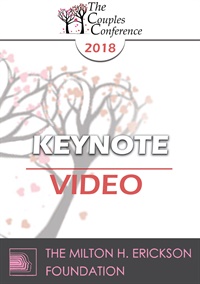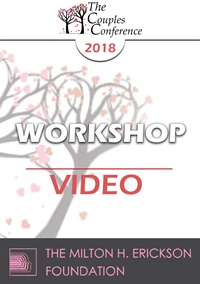
- Average Rating:
- Not yet rated
- Topic Areas:
- Addiction | Deception | Keynotes | Psychobiological Approach to Couples Therapy (PACT) | Affairs | Abuse | Neurobiology | Couples Therapy
- Categories:
- Couples Conference | Couples Conference 2017
- Faculty:
- Stan Tatkin, PsyD, MFT
- Course Levels:
- Master Degree or Higher in Health-Related Field
- Duration:
- 55:09
- Format:
- Audio and Video
- Original Program Date:
- Apr 01, 2017
- Short Description:
- Of all the challenges to the couple therapist the most common is the matter of the affairs, addictions, and deception. In this one- hour presentation, attendees will learn various methods of detecting cheating, lying, and substance and non-substance abuse very early in the process of couple therapy. We will be looking at these behaviors from both psychobiological and neurobiological perspectives.
- Price:
-
Sale is $29.00
price reduced from Base Price - $59.00
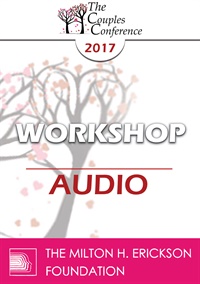
- Average Rating:
- Not yet rated
- Topic Areas:
- Addiction | Workshops | Love | Relationships | Attachment | Couples Therapy | Sex and Sexuality | Attunement
- Categories:
- Couples Conference | Couples Conference 2017
- Faculty:
- Alexandra Katehakis, MA, MFT
- Duration:
- 1:57:10
- Format:
- Audio Only
- Original Program Date:
- Mar 31, 2017
- Short Description:
- Sex addiction destroys trust in relationships, traumatizing the partner, the sex addict, and the family system. Betrayal is an attachment injury that topples the regulatory systems of both parties, and when relational trauma is left untreated, both parties and the family system will suffer. Thus, when acute emotional and physical symptoms become chronic, treatment becomes more difficult making the prognosis for restoring the coupleship poor. Rapid intervention and interactive regulation between the couple is essential for relational healing to begin immediately. Attunement, communication, and empathy (ACE) are the three-pronged stool that supports the long, and sometimes arduous journey to restoring trust.
- Price:
- $15.00 - Base Price
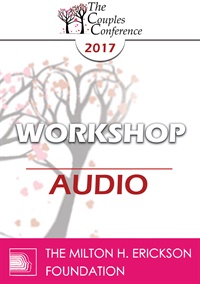
- Average Rating:
- Not yet rated
- Topic Areas:
- Addiction | Couples Therapy | Workshops
- Categories:
- Couples Conference | Couples Conference 2017
- Faculty:
- Sue Diamond, MA, RCC
- Duration:
- 1:57:23
- Format:
- Audio Only
- Original Program Date:
- Apr 02, 2017
- Short Description:
- CC17 Workshop 12 - The Sober Truth: Doing Effective Couples Therapy with Addicted Partners - Sue Diamond Potts, MA, RCC Addiction is rampant in our society. Many of us have been both bombarded professionally with this reality and touched personally in some form. Addicts are like tornadoes ravaging their way through the lives of others, and people in need of immediate care are left bleeding on the sidelines. And yet,
- Price:
- $15.00 - Base Price
Tags: Addiction
Credit available - Click Here for more information
- Average Rating:
- Not yet rated
- Topic Areas:
- Addiction | Keynotes | Continuing Education | Love | Couples Therapy | Neuroscience | Sex and Sexuality
- Categories:
- Couples Conference | Couples Conference 2018 | Online Continuing Education
- Faculty:
- Helen E. Fisher, PhD
- Course Levels:
- Master Degree or Higher in Health-Related Field
- Duration:
- 57:05
- Format:
- Audio and Video
- Original Program Date:
- May 04, 2018
- Short Description:
- Biological anthropologist Helen Fisher discusses three brain systems that evolved for mating and reproduction: the sex drive; feelings of intense romantic love; and feelings of deep attachment to a long term partner. She then focuses on her brain scanning research (using fMRI) on romantic rejection and the trajectory of love addiction following rejection. She concludes with discussion of the brain circuits associated with long-term partnership happiness and the future of relationships in the dig
- Price:
-
Sale is $29.00
price reduced from Base Price - $59.00
Credit available - Click Here for more information
- Average Rating:
- Not yet rated
- Topic Areas:
- Addiction | Couples Therapy | Workshops | Continuing Education | Love | Neurobiology | Neuroscience
- Categories:
- Couples Conference | Couples Conference 2018 | Online Continuing Education
- Faculty:
- Helen E. Fisher, PhD
- Course Levels:
- Master Degree or Higher in Health-Related Field
- Duration:
- 1:57:48
- Format:
- Audio and Video
- Original Program Date:
- May 04, 2018
- Short Description:
- Biological Anthropologist Helen Fisher discusses four broad basic styles of thinking and behaving associated with four primary brain systems: the dopamine, serotonin, and testosterone and estrogen/oxytocin systems. She discusses why people are predisposed to love one person rather than another (mate choice). She hypothesizes that individuals who primarily express of the constellation of traits linked with each of these brain systems may be predisposed to different forms of love addiction, includ
- Price:
-
Sale is $29.00
price reduced from Base Price - $59.00
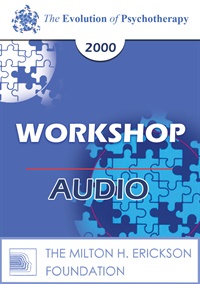
- Average Rating:
- Not yet rated
- Topic Areas:
- Addiction | Workshops | Psychotherapy
- Categories:
- Evolution of Psychotherapy | Evolution of Psychotherapy 2000
- Faculty:
- Claudia Black, PhD
- Duration:
- 2 Hours 30 Minutes
- Format:
- Audio Only
- Original Program Date:
- May 25, 2000
- Short Description:
- This workshop will address how clients with addictive and co-occurring disorders are confounded by family of origin issues. Participants will gain an understanding of· multi-addictive processes. Relationships between these and co-occurring disorders and treatment practices will be addressed.
- Price:
- $15.00 - Base Price
Tags: Addiction Psychotherapy

- Average Rating:
- Not yet rated
- Topic Areas:
- Topical Panels | Addiction | Psychotherapy
- Categories:
- Evolution of Psychotherapy | Evolution of Psychotherapy 2005
- Faculty:
- Claudia Black, PhD | Robert Dilts, BA | James Hillman, PhD | Scott Miller, PhD
- Duration:
- 58 Minutes
- Format:
- Audio Only
- Original Program Date:
- Dec 10, 2005
- Short Description:
- Topical Panel 18 from the Evolution of Psychotherapy 2005 - Treating Addictions Featuring Claudia Black, PhD; Robert Dilts; James Hillman, PhD; and Scott Miller, PhD Moderated by Betty Alice Erickson, MS
- Price:
- $15.00 - Base Price
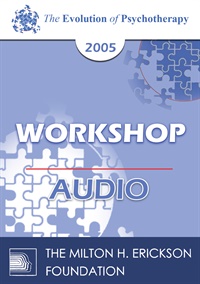
- Average Rating:
- Not yet rated
- Topic Areas:
- Workshops | Addiction | Meditation, Spirituality and Yoga | Mind-Body | Psychotherapy
- Categories:
- Evolution of Psychotherapy | Evolution of Psychotherapy 2005
- Faculty:
- Marion Woodman, LLD, DHL, PhD
- Duration:
- 2 Hours 2 Minutes
- Format:
- Audio Only
- Original Program Date:
- Dec 08, 2005
- Short Description:
- The subtle body is the bridge between the physical body and the spirit. There will be a brief discussion of Embodied Soul and its use with addictions, eating disorders and co-dependant relationships. Then, in this experiential personal development program, participants will work with the transformation of personal dream images to "open" the body. It is recommended that participants bring a blanket or coat for simple meditation exercises that will be conducted lying on the floor.
- Price:
- $15.00 - Base Price
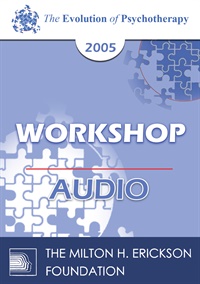
- Average Rating:
- Not yet rated
- Topic Areas:
- Workshops | Addiction | Family Therapy | Family Systems | Psychotherapy
- Categories:
- Evolution of Psychotherapy | Evolution of Psychotherapy 2005
- Faculty:
- Claudia Black, PhD
- Duration:
- 2 Hours 38 Minutes
- Format:
- Audio Only
- Original Program Date:
- Dec 08, 2005
- Short Description:
- Beginning with a historical view of addiction in the family, Dr. Black will identify the many challenges of working family systems. The workshop will include a variety of intervening strategies to engage family members as a part of the recovery process.
- Price:
- $15.00 - Base Price
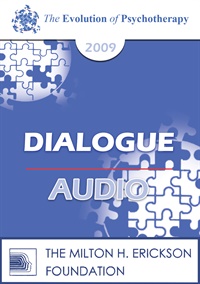
- Average Rating:
- Not yet rated
- Topic Areas:
- Addiction | Dialogues | Psychotherapy
- Categories:
- Evolution of Psychotherapy | Evolution of Psychotherapy 2009
- Faculty:
- Claudia Black, PhD | Robert Dilts, BA
- Duration:
- 1 Hour
- Format:
- Audio Only
- Original Program Date:
- Dec 12, 2009
- Short Description:
- EP09 Dialogue 11 – Addictive Behavior – Claudia Black, PhD and Robert Dilts Educational Objective: Given a topic, to describe the differing approaches to psychotherapy, and to identify the strengths and weaknesses of each approach.
- Price:
- $15.00 - Base Price
Tags: Addiction Psychotherapy
Please wait ...


